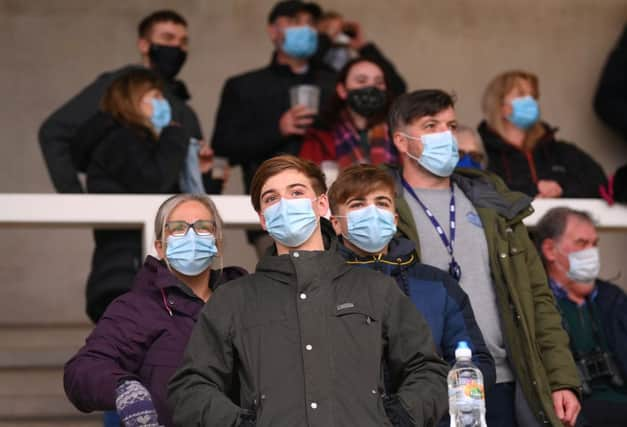The best and worst face masks on the market - as study finds 'alarming flaws' in popular brands


Testing has found “alarming flaws” in the effectiveness of widely-available face coverings, with one popular reusable mask only blocking a third of potentially harmful particles, consumer group Which? has reported.
The watchdog tested a range of popular brands and styles of face coverings and masks for how well they filtered particles, how breathable they were, and how they fared after multiple washes.
Advertisement
Hide AdAdvertisement
Hide AdWhich? found that the best performing face covering was able to block more than 99% of potentially harmful bacterial particles, filtering just as well as a disposable mask, but the worst product only trapped a third of the particles passing through.
Some of the face coverings with high filtration claims on the packet did not live up to them in Which? testing, and seven of the 12 had poor packaging instructions that failed to provide key information for maximising effectiveness and protecting the wearer.
Adidas only filters a third of particles
The Adidas face covering (£17 for a pack of three), sold at retailers including Asos, Next and Sports Direct, only filtered a third of particles in Which?’s tests, while the Vita Shield face covering (£9.99 for three) dropped from 60% filtration on first use to 38% after five washes.
Adidas told Which? its mask was designed early on in the pandemic, before there were defined performance criteria for non-medical face coverings, and that its mask was tested for comfort and breathability.
Advertisement
Hide AdAdvertisement
Hide AdThe Vita Group said its face covering had been tested at external accredited testing facilities, which showed filtration levels of more than 90%. It said that the discrepancies in results demonstrated the need for mandatory, overarching standards to be put in place.
The highest-scoring face covering tested was the Airpop Pocket (£24.99 for four), available direct from Airpop or on Amazon. The covering is made from similar materials to disposable masks and does a superb job of filtration – though it is “semi-reusable”, so can only be washed and reused a set number of times before it needs to be thrown away.
Other high performers were masks from Superdrug (£4.99 for three), The Big Silk (£16.90 for one) and Marks & Spencer (£9.50 for five), which scored well for filtration, breathability and comfort.
Some reusable face masks now display filtration levels on the packet, but four of those did not achieve the stated levels when tested by Which?
Advertisement
Hide AdAdvertisement
Hide AdThe Wise Protec (£10 for one), sold at John Lewis, Matalan and Home Bargains, and Alvita (£7 for two) mask, sold at Boots, both claim more than 90% filtration efficiency, but Which? tests showed lower levels, at 80% and 82% respectively. After washing, this dropped to the high 60s for both.
Boots’ Adult Reusable Face Mask (£10 for two) claims more than 95% filtration, which was borne out in initial tests, but after five washes this dropped to 75%.
Wise Protec and Alvita told Which? that their above-90% filtration levels had been verified in independent, accredited labs. Boots also said its mask had been “rigorously tested”.
Poor mask hygiene could increase risk of infection
Seven of the 12 products Which? tested also had poor usage and washing instructions on the packaging, both of which are key for maximising effectiveness, as poor mask hygiene could increase your risk of infection.
Advertisement
Hide AdAdvertisement
Hide AdWhich? looked for basic information on the packet, like detailed cleaning instructions including washing method, frequency and temperature. Researchers also expected to see clear warnings about how to correctly wear the mask, and confirmation that it was not a medical device.
Which? Magazine editor Harry Rose said: “Our tests show there is still work to be done to improve the quality of face coverings. While the best reusable face coverings can be just as effective as a disposable mask, there are still too many that fall short of the mark.
“We would like to see more manufacturers committing to minimum performance standards for filtration and ensuring basic safety instructions are present, but for now it is worth taking time to research the best option for yourself and your loved ones before buying.”
A spokesman for Vita Group said: “The Vita Group stands behind the test results rigorously generated over the last 12 months by Centexbel, a world-renowned independent accredited test centre. Their results bear no relation to the results obtained by Which?, which supports our view that mandatory standards need to be outlined by legislation for all face coverings.
Advertisement
Hide AdAdvertisement
Hide Ad“As part of the development of the Vita Shield, extensive tests at external third party-accredited laboratories have taken place across the UK and Europe over the past year with the Vita Shield recording 99% filtration efficiency and 99% filtration efficiency after 10 wash cycles.”
